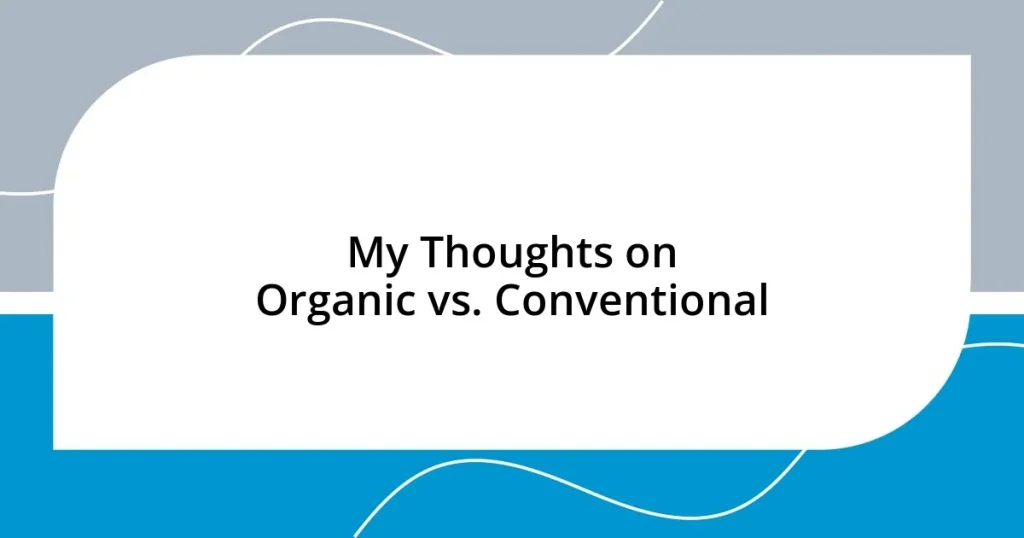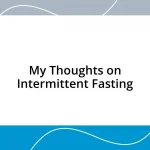Key takeaways:
- Organic farming promotes environmental sustainability, healthier soil, and biodiversity, contrasting sharply with the chemical reliance of conventional farming.
- Both organic and conventional foods have unique nutritional benefits, with organic often having more antioxidants, while conventional can yield higher specific vitamins due to larger volumes.
- Consumer choices between organic and conventional foods are influenced by personal values, health perceptions, and affordability, highlighting the emotional complexities of food decisions.
- Making informed food choices requires understanding ingredient labels and reflecting on personal health, environmental ethics, and economic factors, transforming eating into a meaningful ritual.
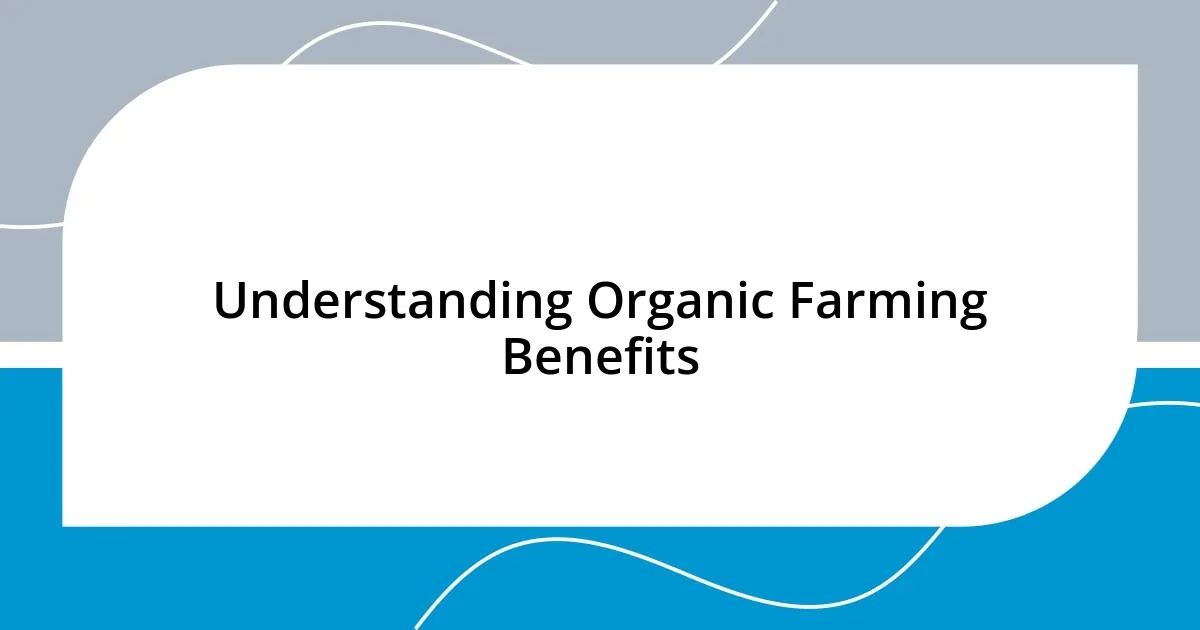
Understanding Organic Farming Benefits
One of the standout benefits of organic farming is its commitment to environmental sustainability. I remember walking through an organic farm, the rich smell of earth under my feet, and it struck me how much healthier the soil looked compared to conventional farms. Isn’t it amazing to think that these practices can not only yield healthier crops but also promote biodiversity and preserve ecosystems?
The absence of synthetic pesticides and fertilizers in organic farming really caught my attention, especially when I learned how these chemicals can impact our health. I once read a study that linked prolonged exposure to certain pesticides with various health issues. This knowledge has shifted how I prioritize organic options in my diet. Who wouldn’t want to nourish themselves with safer food choices?
Another facet that often gets overlooked is the taste difference in organic produce. I recall biting into an organic tomato, and it was like a burst of summer in my mouth. Isn’t it interesting how something so simple can elevate our dishes? This kind of quality truly sets organic farming apart, making it not just a healthier choice but also a more enjoyable one.
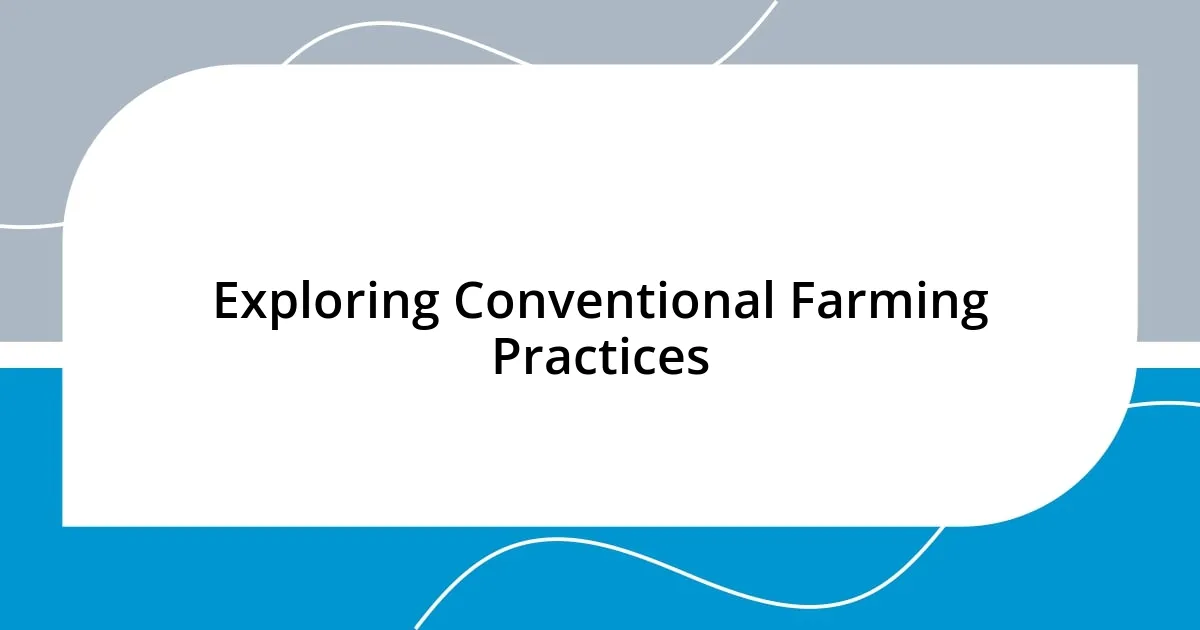
Exploring Conventional Farming Practices
Conventional farming practices have been the backbone of modern agriculture for decades, focusing on maximizing yield and efficiency. I recall visiting a large conventional farm where I was struck by the extensive use of machinery and chemicals. The sheer scale of their operations was impressive, but I couldn’t help but feel a twinge of concern about the long-term effects of such practices on our land and health.
Here are some key aspects of conventional farming I’ve found noteworthy:
- Synthetic Inputs: Utilization of synthetic fertilizers and pesticides to enhance crop production.
- Monoculture: Focusing on a single crop type over large areas to simplify planting and harvesting.
- Mechanization: Heavy reliance on machinery to increase efficiency and reduce labor costs.
- Irrigation: Implementation of advanced irrigation techniques, often leading to increased water use.
- Economies of Scale: Larger operations benefiting from bulk purchasing and production efficiencies.
While these practices can lead to high yields, they often raise questions about sustainability and safety, which I find crucial as we consider our food systems’ future.
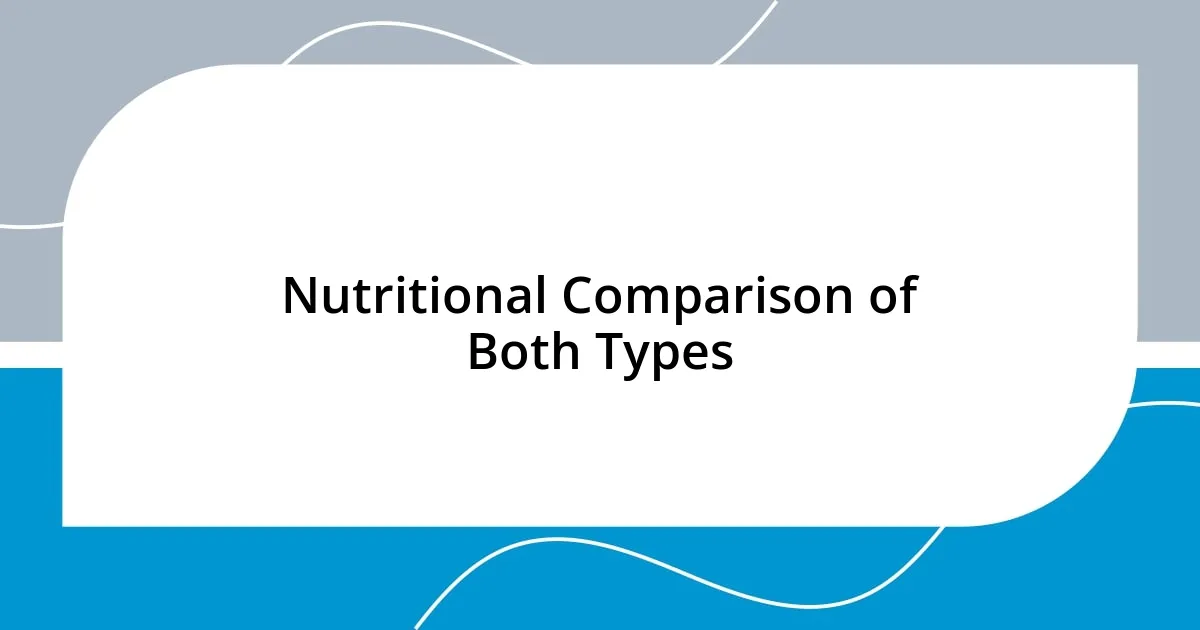
Nutritional Comparison of Both Types
Organic and conventional foods often ignite passionate debates, particularly around their nutritional profiles. From my research and personal experience, I’ve noticed that organic foods can sometimes boast higher levels of certain nutrients. For instance, organic fruits and vegetables often contain more antioxidants. I felt a real connection to this when I discovered that these compounds can play a role in reducing inflammation and fighting disease, which is something I strive for in my daily life.
On the other hand, I’ve found that conventional produce tends to contain similar nutrient levels, sometimes even surpassing organics in specific vitamins and minerals due to higher yields. This surprised me, especially after thinking that organic would always win in the nutrition department. The reality is that soil quality, farming practices, and local conditions can all influence nutritional content independently of organic or conventional methods.
Ultimately, when it comes to nutritional value, both types of farming offer unique benefits. I remember discussing this topic with a friend who swears by organic for its health benefits, but I pointed out that we shouldn’t dismiss conventional products entirely without considering their role. Balancing choices based on personal dietary needs and preferences seems to be the best approach.
| Nutrient | Organic | Conventional |
|---|---|---|
| Antioxidants | Higher levels | Varies |
| Vitamins | Comparable | Often higher |
| Fertilizer Residue | Minimal | Potentially higher |
| Pesticide Levels | Lower | Higher possible |
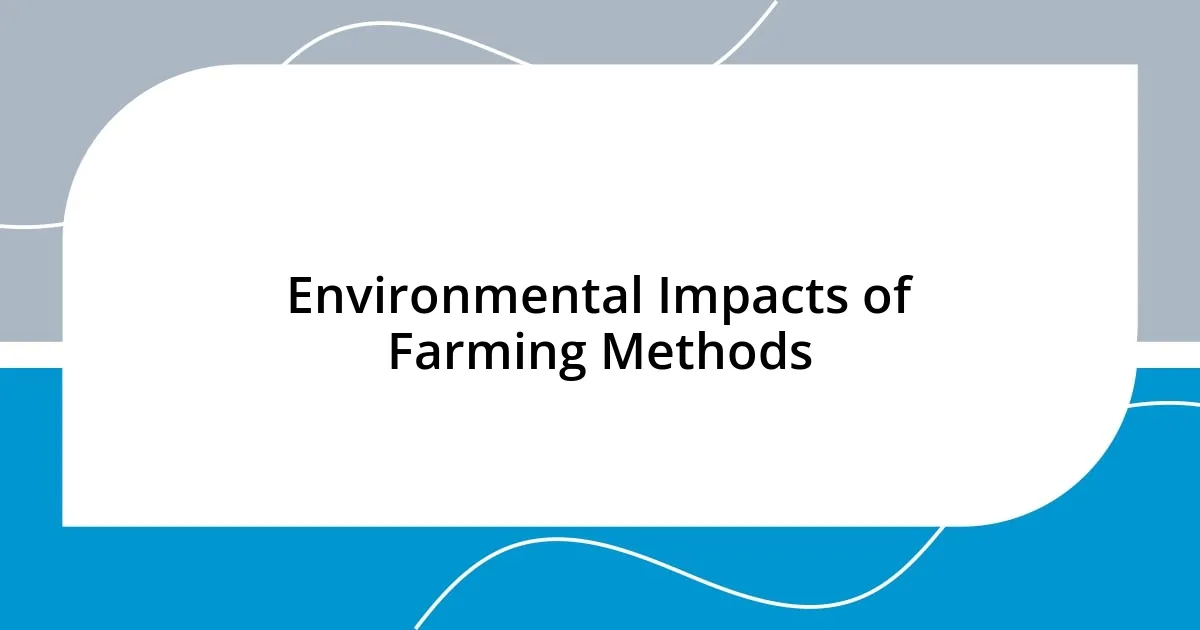
Environmental Impacts of Farming Methods
The environmental impact of farming methods is an area that I find particularly crucial to explore. Conventional farming, with its heavy reliance on chemicals, often leads to soil degradation and water pollution. I remember driving past a river near a conventional farm and seeing how murky the water became after heavy rainfall, raising questions in my mind about the health of nearby ecosystems.
In contrast, I’ve observed that organic farming tends to foster more biodiversity. I think about visiting an organic farm where vibrant wildflowers were interspersed between crops, attracting beneficial insects. This approach not only enriches the soil naturally but also supports various species, creating a balanced ecosystem. Isn’t it fascinating how the choice of farming method can dictate the health of our environment?
I’ve come to realize that the choices we make around our food have broader implications than we often consider. Each time I choose organic, I feel like I’m supporting practices that promote sustainable land use. Isn’t it reassuring to think that our food choices can contribute to a healthier planet? The more I delve into this topic, the more I recognize the profound relationship between what we eat and the environmental footprint of our farming methods.
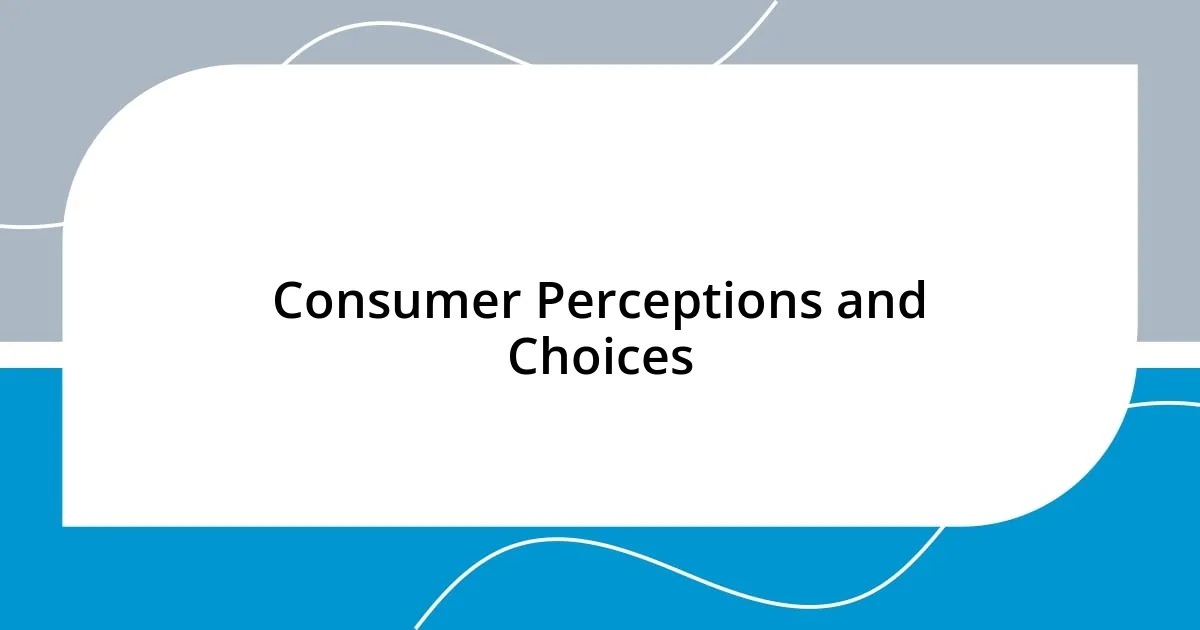
Consumer Perceptions and Choices
Consumer perceptions of organic versus conventional food play a significant role in shaping purchasing choices. I recall a moment at the grocery store when I overheard a couple debating whether to spend a bit more on organic apples. It struck me how emotional these decisions can be, rooted largely in personal beliefs about health and sustainability. This shows that for many, the label isn’t just about the food—it’s tied to their values and the lifestyle they aspire to.
Interestingly, I’ve noticed that some consumers are influenced by marketing messages that promote organic foods as superior, often framing them as a ‘healthier’ choice. While these claims resonate with me on a personal level, I also connect this back to my own journey with food. When I first switched to organic, I felt empowered, believing I was making the healthiest choices for myself and my family. However, I’ve learned that each person’s experience and perception can vary widely, depending on their priorities, misconceptions, and even their financial situation.
It’s fascinating how people navigate these decisions! I often ask myself, what truly drives someone to choose one over the other? For instance, I remember meeting a friend who primarily opted for conventional options. They mentioned affordability as a critical factor, which sparked a conversation about the accessibility of organic foods. I realized that understanding consumer choices requires a deeper look into both individual values and societal influences. What if we could broaden these conversations around food, allowing everyone to feel included in the choices they make?
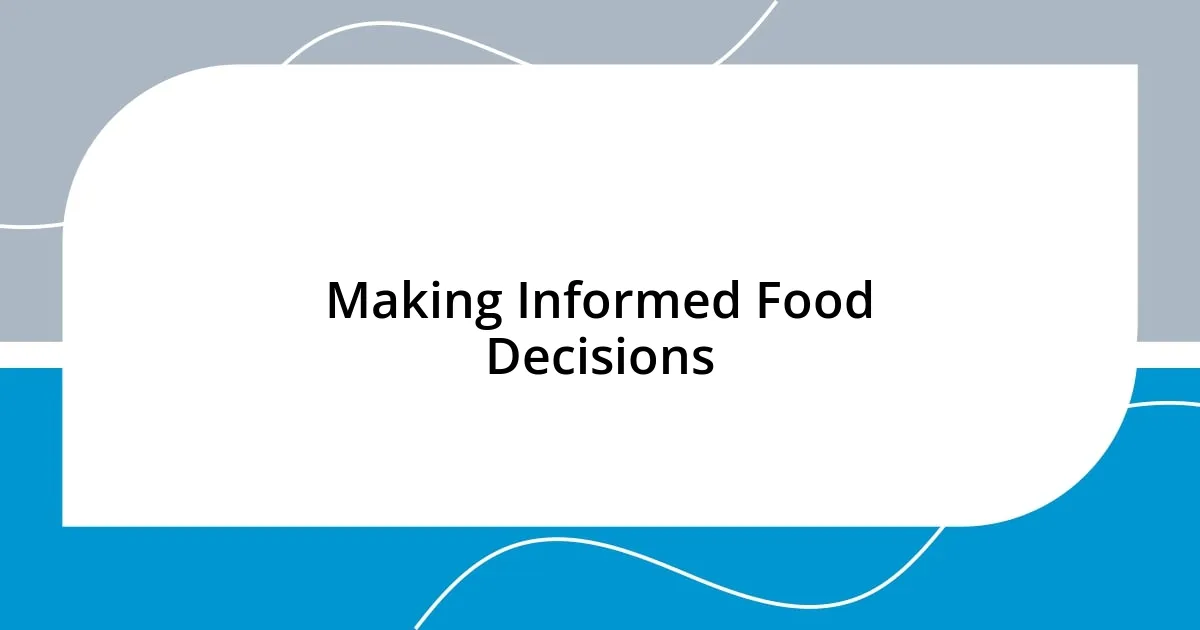
Making Informed Food Decisions
Making informed food decisions involves understanding exactly what we’re putting into our bodies and the impacts that our choices can have. I remember the first time I dove into the labels at the grocery store, carefully reading the ingredients and certifications. It was an eye-opener for me; I was shocked at how often I found additives in conventional products that I couldn’t even pronounce! This sparked a commitment to seek out simplicity and transparency in what I eat, prompting me to dig deeper into the differences between organic and conventional foods.
Navigating this space can be complicated. I once had a lively discussion with a friend who was skeptical about the benefits of organic food. Listening to their doubts about the price differences made me reflect on my own beliefs. Were my choices just a trendy preference, or did they actually hold up under scrutiny? I realized that the conversation about food choices isn’t black and white—it’s rich and nuanced, intertwining personal health, environmental ethics, and economic realities. Understanding where our foods come from can empower us, ensuring we feel confident in every decision we make.
Eating should be a joyful experience, not a stressful one. One day, while prepping dinner, I found myself lost in thought, pondering the origins of my groceries. I felt a surge of satisfaction as I opened a bag of organic vegetables that I had sourced from a local farmer. I couldn’t help but feel a connection to the land and the people who grew them. This kind of awareness transforms the mundane act of eating into a meaningful ritual. Isn’t it wonderful to think that our food choices can reflect our values and beliefs, guiding our health and the planet’s wellbeing?











